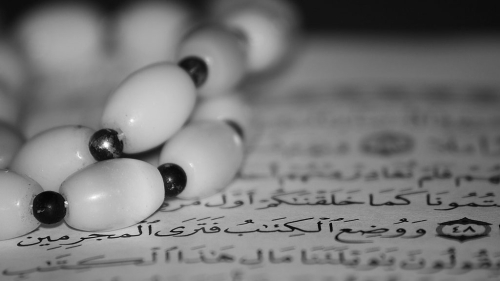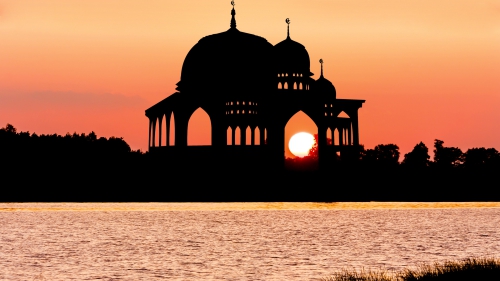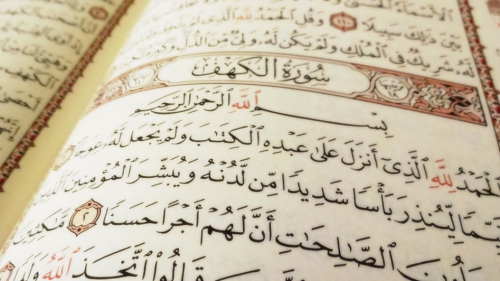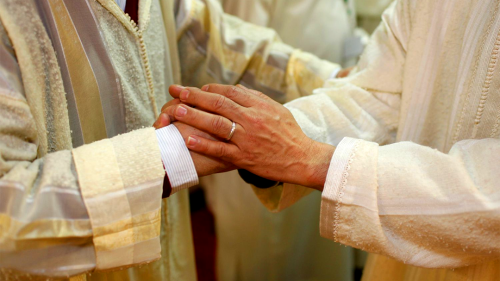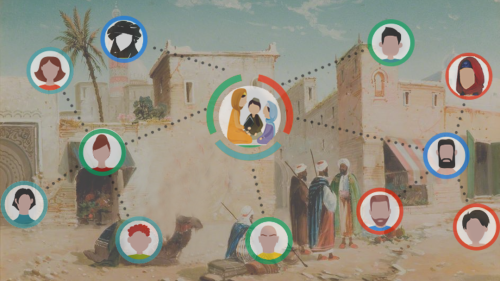Sincerity in intentions
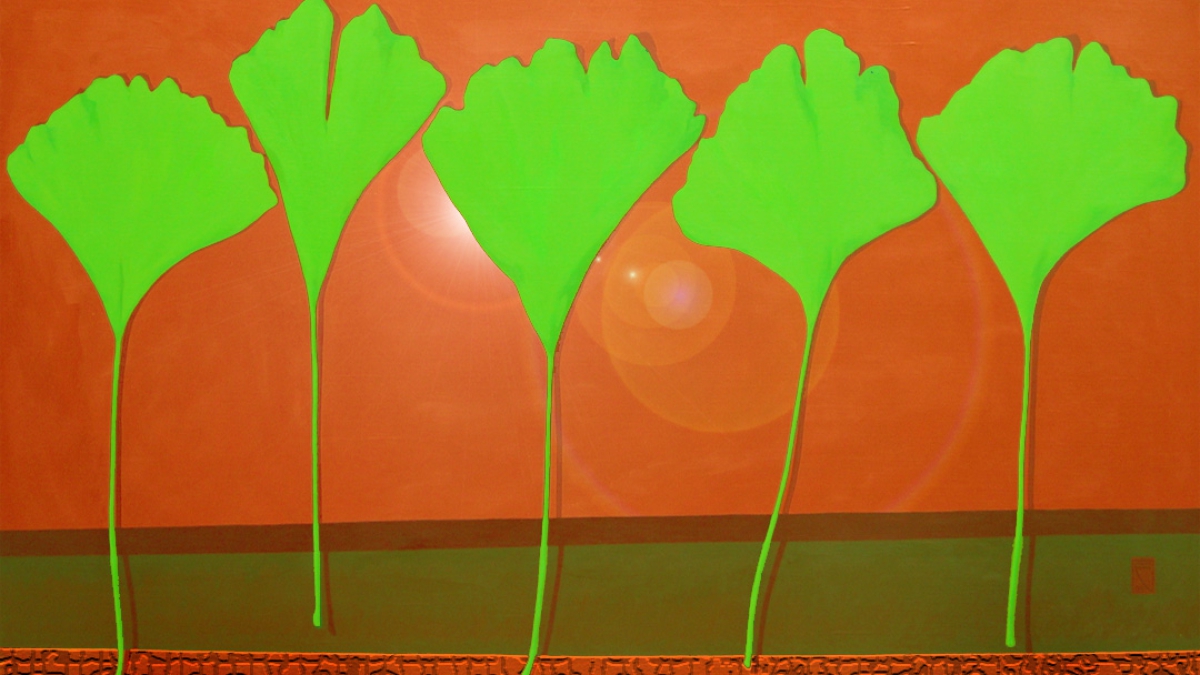
The motivations and factors that prompt people to do a job in a better way, to strive hard and to bear trials and tribulations, the motivations that induce them to sacrifice their property and sometimes their lives, are many and varied. One manifests itself in peoples' involvement with their work; while another motivation remains hidden in the interior recesses of the heart and cannot be discerned from the outside. Many times the performer of an act is him[her]self unaware of it, although s[he] is influenced by it, and the secret of his[her] acceptance or non-acceptance is hidden in that awareness. But the observer can very easily decipher a person's motivations. S[he] need only watch him/her at work. S[he] may be seen involved in positive goals such as helpfulness or more negatively in self-love and self-preservation, greed for more wealth, feelings of pride and self-importance, hypocrisy, or desire for fame.
Hear what the people talk about. Take a survey of their daily activities. You will not find anything else in the axis of their talk and efforts, but their feelings of joy and hatred, pride and conceit. Islam judges acts and deeds and decides about their importance on the basis of the intentions, feelings, and sensations behind them. In Islam the value of an act depends on the nature of the motivation that prompted the act to be performed. Sometimes people give costly donations and gifts so that, through these good acts, they will attract others who will talk about their generosity, and sometimes their purpose is to give valuable presents to a person who treated them well. Both these acts are of charity and generosity, which were guided, as pointed out by the psychologists, by the people's consciousness, directly or indirectly. But Islam does not give importance to charity if it is given in a hypocritical way or for attaining fame. An act has little value unless it is performed for the purpose of seeking the pleasure of Allah:
"We are feeding you for the sake of Allah. We do not expect from you any compensation or thanks" (Q 76:9) "Those who spend their wealth in self-purification, and have in their minds no favor from anyone for which a reward is expected, but have only the desire to seek the pleasure of their Lord Most High, soon will they attain (complete) satisfaction" (Q 92:18-21)
To correct the inclinations of the heart and to keep it away from superficial desires, the Prophet has said - "Acts depend on their intention.... If anybody migrates with the intention of gaining the world or to marry a certain woman, then his migration will be counted for the purpose for which he has left his house." (Bukhari)
The distance between Makkah and Madinah is traversed by thousands of travelers for different purposes, but the purpose of attaining supremacy for the religion and for keeping oneself alert is the thing that distinguishes a Muhajir (migrant) from a common traveler, although the acts of both persons are the same. People who left Makkah to go to Madinah so that they may save their religion from danger and to form a new government in the new city was called a Muhajir, but another person who traveled for another purpose had no particular connection with the hijra (migration).
Purity of Purpose
It is the correctness of intention and sincerity that elevates a person's worldly action and makes it into prayer. But if there is perversion in the intention and corruption in the heart, people are degraded, regardless of prayers they may have offered. Many times people build high and lofty palaces, broad and spacious buildings, lay out beautiful gardens full of fruit. If in these efforts and labor of construction the purpose is to benefit humanity, then for these acts the planners will become recipients of unending reward (sawab). Many such constructors of society have been kings. Of them Allah's Messenger commended:
"Anybody who, without subjecting another person to cruelty or aggression, builds a magnificent building or plants saplings without indulging in cruelty or rancor, will be getting reward for the fullness of the time in which Allah's creatures are benefited by these things." (Ahmed)
In another tradition it is stated that "If a Muslim lays a garden or does fanning, and if bird or man eats something grown by him, then he will gain virtue in its place." Even carnal pleasures can be counted as acts of virtue, if enjoyed with righteous intention and clean purpose. Ibn Abi Waqqas narrates the following recommendation of the Prophet: "If you spend even a little to seek the pleasure of Allah, you are rewarded, so much so, that even putting a morsel of food in the mouth of your wife is a virtuous act."
Another tradition has it that: "Whatever you feed your father is charity from you. Whatever you feed your child is a means of reward for you, and whatever you feed your servant, is also charity from you." (Ahmed)
The fact is that, as long as people remain obedient to Allah and their intentions are pure and sincere, all their acts and movements, their sleep and their waking, are considered to be for the pleasure of Allah. It sometimes happens that people want to perform a righteous act but are unable to do so because of their poverty. Then Allah, who
knows the secrets of hearts, gives the person desirous of reform the honor of reform or the person desirous of striving in the cause of Allah the honor of a Mujahid (striver in the cause of Allah). In the eyes of God high courage and righteous intention are thus noble while poverty is of no fault.
Once, during the early days of Islam, when the followers were in dire scarcity and poverty, a battle was to be fought. Some people came to the Prophet to join his forces and offered themselves to be sacrificed in the cause of Allah. But Allah's Messenger did not allow them to take part in the jihad because of their incapability. They returned with heavy and sorrowful hearts. They were deeply grieved for not being allowed to participate in jihad. The following verses about them were revealed:
"(About) those who came to you to be provided with mounts- (It is acceptable that) you said 'I can find no mounts for you,' causing them to turn back, their eyes streaming with tears of grief that they had no resources wherewith to provide the expenses." (Q 9:92)
Do you think that firm and strong faith is ever wasted? Did you think the burning desire of the volunteers for battle would be lost? No, never. The Prophet profoundly appreciated their faith and said to the soldiers going with him:
"There are some people whom we have left behind in Madinah. In whatever place or valley we may camp, they will be with us. For them their intention is enough." (Bukhari)
Since their plans were earnest, these excused mujahideen became nonetheless recipients of the reward (sawab) of the jihad, because they had stayed in Madinah against the wishes of their hearts. If this is the reward for honest intention, imagine the result of dishonest intention! Horrendous punishment is reserved for bad deeds; all the more so, if the act is made to appear righteous. Hypocrisy is mightily condemned. "Woe to the worshippers who are neglectful of their prayers, those who (want but) to be seen, but refuse neighborly needs." (Q 107:4-7)
Prayer based on hypocrisy is considered a sin because, after losing sincerity, it has become dead and is, therefore, useless. Similar is the case of zakat. If it is paid merely to seek Allah's pleasure, then it can be acceptable to Allah. Otherwise it is a waste:
"Waste not your charity by reminders of your generosity like him who spends his wealth to be seen by people and believes not in Allah and the last day. His likeness is the likeness of a rock on which there is dust of earth; on it heavy rainfalls, which leaves it a bare stone. They will be able to do nothing with anything they have earned." (Q 2:264)
The heart which is bereft of sincerity is infertile, as the rock with some dust on it cannot grow any grain when rain falls on it. If the kernel is rotten, beautiful outer skin will not be of any use. However, if we are full of sincerity, then its blessing helps to make an ordinary thing as weighty as a mountain. If devoid of sincerity, what reward can mounds of chaff and husks achieve from Allah? That is why Allah's Messenger said "Make your faith pure; a little (righteous) act will be sufficient to save you from hell." (Al-Hakim)
In the hadith the reward for virtuous acts has been said to be from ten to a hundred fold, depending on the performer's intention and the sincerity hidden in his/her heart, which is known only to that Being who knows about all manifest as well as hidden things. Rewards increase according to the sincerity and honesty of intentions. The external acts of people can neither achieve the pleasure of Allah nor the true grandeur in worldly life. Allah gives His attention to His faithful and accepts only those acts that bring them nearer to Him. As regards worldly show and human trappings, they have no importance and no value. The Prophet once recounted that "Allah does not look at your bodies nor does He look at your faces, but He looks at your hearts." The following is mentioned in the hadith:
"When doomsday occurs, the deeds done in the world will be presented to Allah. From them the acts performed for Allah will be separated. And the other acts performed for other purposes will be
thrown into the fire of hell." (Baihaqi)
Those who adopt these truths in life will experience relief and comfort in this world and will also achieve eternal bliss in the hereafter. They will not be harmed by the loss of anything. Nor will they grieve for any act. As the Prophet said:
"The man who leaves his world, having performed acts sincerely for the One and Only Allah, having established prayer and paid zakat, Allah is pleased with him." (Ibn Maja) This hadith is in conformity with these words of revelation: "And they have been commanded no more than this: to worship Allah, offering Him sincere devotion, being true (in faith), establishing regular prayer, and practicing regular charity; that is religion, right and straight" (Q 98:5)
In times of scarcity and adversity, the rays of sincerity throw their light with full force. At such times many people separate themselves from their carnal desires and yearnings. They sever relations with their defects and errors. They repent before Allah and weep, wail, and pray for His blessings. They shake for fear of Allah's wrath. The Quran has drawn a very fine picture of such a person, who is surrounded by adversities, who out of fear, has forgotten all his[her] mischief and is appealing to his/her Merciful Lord, so that He may lift him out of this mire: "Say - who is it that delivers you from the dark recesses of land and sea, when you call upon Him in meekness and silent terror; if He only delivers us from these (dangers), (we vow) we shall truly show our gratitude? Say - it is Allah that delivers you from these distresses; yet you run after false gods" (Q 6:63-64)
This sincerity is temporary. Those conditions that simply befall a man, how can they be called moral conduct? Allah wants to be truly and correctly known and recognized and should be respected and honored under all conditions, as deserving of Him. People should give their due with honest and sincere intention, supported by good conduct. Their attachment to noble attributes should be strong and should not break so easily. They should not make anything but selflessness and Allah's pleasure the ideals to follow in life.
Often the heat of sincerity gradually disappears as passion for greed, wealth, self-love, egotism, hunger for position and office, hypocrisy, and desire to be famous increase. But to Allah the only desirable act is one free of impure motives. "Surely, pure religion is for Allah only." (Q 39:3) The example of superior human nature is like that of a ripe fruit that requires to be protected from disease and mishaps in order to preserve its sweetness and cleanness. For this reason Islam considers hypocrisy in righteous acts most abominable and has declared it to be shirk, associating some one else with Allah.
The truth is these kinds of hypocrisy destroy the quality of all acts, just as termites slowly destroy all things they come in contact with. Once the habit of hypocrisy actually takes root, it grows into a sort of idolatry and throws its practitioner into the fire of hell.
The Prophet said: "The slightest hypocrisy is also polytheism. He who is hostile to Allah's friends, openly declares war against Allah. Allah likes those who are righteous, who fear him and who pray secretly, those who would not be missed if they disappear and would not be recognized if they are present. Their hearts are the lamps of guidance. They remove darkness from every piece of land." (Hakim)
Ibn Abbas narrates that one man asked the Prophet, "O Messenger of Allah! I take a stand with the intention of seeking Allah's pleasure, and I wish that the people of my country should see it. What do You think of it?" The following verses were revealed before the Prophet gave an answer - "Whoever expects to meet his Lord, let him work righteousness, and in the worship of his Lord, admit no one as partner." (Q 18:110)
The severe criticism and attacks Islam has unleashed on the evils emanating from hypocrisy and want of sincerity are warranted because they are a kind of insidious corruption that is not discernible. These evils give rise to other evils and increase the rate of corruption of the society considerably. But that sinning that puts on the garb of worship has its evils hidden from the sight of the sinner himself and society is often unable to recognize it. This is because criminals remain absorbed in the ramifications of their acts. They are under the impression that they are also working for the pleasure of Allah. So how can they realize that they have committed a sin? And how can they turn away from a thing they considers righteous?
As regards the general society, it is harmed more by the so called scholars and hypocrites than by the poor and needy. Lack of sincerity in talented, famous people makes their ability into a public curse. In general people want to please others and neglect seeking the pleasure of their Lord. They do not understand, on account of their foolishness, what their sin means. They are turning away from the Being who is Most Powerful and who is independent of everything, to beggars who have neither power nor riches. That is why Allah's Messenger said: "When on the day of resurrection Allah gathers all the people who came first and last, a caller will give a call - 'Whoever has associated another with Allah should seek his reward from that (other) partner because Allah is more free from partnership than all partners."'(Tirmizi)
Whether common soldier or commander, fighting men should keep their jihad free from all the impurities of worldly show and trappings, because they are attached for "life and death" and have a sacred duty, compared to which rank, medals, honors, salary, etc., have no value. They should give preference to whatever is of Allah, and should sacrifice their desires for pure devotion and sincere submission.
"Abdullah bin Amar bin Aas once said, 'Messenger of Allah! show me the difference between jihad and battle.' The Prophet replied, 'O Abdullah bin Amar! If you fight displaying patience and for seeking the pleasure of Allah, then He will resurrect you in the same state; and if you fight with pride on the largeness of your numbers and to show to the people, then Allah will resurrect you in the same state. O Abdullah bin Amar! In whatever condition you fight or you are killed, Allah will resurrect you in that condition.'" (Abu Daud)
The written work that employees do in their offices, the accounts they maintain, the intellectual energy they spend, the manual work they do with their hands, should all be conducted by them in the interest of their country and for seeking the pleasure of Allah. An animal labors the whole day for its fodder. The efforts and labor of a common person have the value of an animal's labor, and all his[her] work and labor are in proportion to his[her] salary, and that seems to him/her to be his[her] purpose and center of activity. But wise people know the value of their ideas and their acts and employ them in the cause of some substantial objective. It is regrettable that general employees suffer from this disease. They often fail to understand anything but wealth, rank, and promotion. They consider their world and religion similarly limited, and they think that material expression is the axis of their happiness and sorrow, action and inaction, desire and ambition, and their lives revolve around it only. Allah's Messenger said: "When the last period comes, there will be three groups in my Umma. One group will sincerely worship only Allah. The second group will worship as hypocrites. The third group will worship so that they may defraud others of their wealth. When Allah gathers them on the day of judgment and says to the last group 'By My honor and grandeur, what did you expect to get from My worship?' Some will answer, 'By Your honor and grandeur, I was fraudulently taking others' property by those (practices).'" (Tibrani)
In the fields of learning and culture deep sincerity is extremely necessary. Knowledge is such a pure and high thing that on its basis Allah granted superiority to man over all the other creatures. Therefore it would be a gross debasement for education to be used to further no more than human desires, reinforced by mischief, corruption, and carnal pleasures. The world has received innumerable serious setbacks at the hands of learned educational leaders who lacked moral character and high goals. Islam has made it compulsory for the teacher and the taught to give proof of sincerity in the matter of knowledge, and to give preference to high values and public interest in all things. But too often the activity of learning and teaching is undertaken with the mere purpose of earning wealth. This limits the utility of learning to a few individuals only. Thus one of our most valuable treasures is wasted with a catastrophic effect for the entire population. The value of learning is depreciated for many or all. As Allah's Messenger said: "Anyone who has obtained learning, through which Allah's pleasure can be obtained, with no purpose other than to achieve success in the world, on the day of resurrection will be unable to smell the fragrance of paradise." (Abu Daud)
This is mentioned in the hadith - "Do not attain learning in order to express pride before the ulema, nor to learn to quarrel with foolish people, nor from it try to overwhelm meetings, for he who does so, his destination is fire" (Ibn Maja)
The religious and worldly learned who are flying their banners all over the world achieved their positions when they were still seekers of truth, when they still avoided mean purposes. There is no reason that the scholars and students must necessarily face trials, and tribulations, and hard times. It is not an inevitable demand of honest intention that sincere people must be subjected to difficulty and be confronted with adversity. The diseases that are generated by lack of sincerity are many. When they grow, they destroy faith, and when they are less in number, they bore holes in it and give a chance to Satan to enter in. Almighty Allah is displeased with the slaves of wealth and position. It is determined for a Muslim that he should sacrifice all interests, relations, and ambition to the cause of Allah. It is not right for him to go after personal fulfillment and forget his Lord and His pleasure. The magicians of Pharaoh established a perfect example of true belief and high sincerity when they rejected all the threats of Pharaoh and trampled below their feet the love of wealth and position, and replied to that tyrant king's challenge in these words:
"So decree whatever you desire to decree; for you can only decree (with regard to) the life of this world. For us, we have believed in our Lord; may He forgive us our faults, and the magic to which you did compel us; for Allah is Best and Most Abiding" (Q 20:72-73)
What a great difference between the sincere and the insincere! One group, of inner strength and chivalrous relationship to all God's creation, disdainfully kicks at the material world; while the other group, in order to reach up to some big personality or to achieve some small gains, makes fun of its own religion and faith and sacrifices both to achieve success in the world.
Excerpted from the book "Morals and Manners: An Islamic Perspective" by Aslam Abdullah







